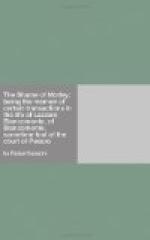Cesare Borgia, this man whose name had so terrible a sound in the ears of Italy’s little princelings, this man whose power and whose great gifts of mind had made him the subject of such bitter envy and fear, until he was the best-hated gentleman in Italy—and, therefore, the most calumniated— was little changed from that Cardinal of Valencia, in whose service I had been for a brief season. The pallor of his face was accentuated by the ill-health in which he found himself just then, and the air of feverish restlessness that had always pervaded him was grown more marked in the years that were sped, as was, after all, but natural, considering the nature of the work that had claimed him since he had deposed his priestly vestments. He was splendidly arrayed, and he bore himself with an imperial dignity, a dignity, nevertheless, tempered with graciousness and charm, and as I regarded him then, it was borne in upon me that no fitter name could his godfathers have bestowed on him than that of Cesare.
The Lord Filippo exerted all his powers worthily to entertain his noble and illustrious guest, and by his extreme, almost servile affability it not only would seem that he had forgotten the favour and shelter he had received at the hands of the Lord Giovanni, but it confirmed my suspicions of his willingness to advance his own fortunes by breaking with the fallen tyrant in so far as his sister was concerned.
Short of actually making the proposal itself, it would seem that Filippo did all in his power to urge his sister upon the attention of Cesare. But Duke Valentino’s mind at that time was too full of the concerns of conquest and administration to find room for a matter to him so trifling as the enriching of his cousin Ignacio by a wealthy alliance. To this alone, I thought, was it due that Madonna Paola escaped the persecution that might then have been hers.
On the morrow Cesare moved on to Rimini, leaving his administrators behind him to set right the affairs of Pesaro, and ensure its proper governing, in his name, hereafter.
And now that, for the present, my hopes of ever seeing my own wrongs redressed and my estates returned to me were too slender to justify my remaining longer in Pesaro, I craved of the Lord Filippo permission to withdraw, telling him frankly that my tardily aroused duty called me to my widowed mother, whom for some six years I had not seen. He threw no difficulty in the way of my going; and I was free to depart. And now came the hidden pain of my leave-taking of Madonna Paola. She seemed to grieve at my departure.
“Lazzaro,” she cried, when I had told her of my intention, “do you, too, desert me? And I have ever held you my best of friends.”
I told her of the mother and of the duty that I owed her, whereupon she remonstrated no more, nor sought to do other than urge me to go to her. And then I spoke of Madonna’s kindness to me, and of the friendship with which she had honoured one so lowly, and in the end I swore, with my hand on my heart and my soul on my lips, that if ever she had work for me, she would not need to call me twice.




